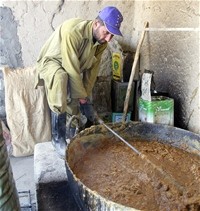
Working with the Afghan Government, USAID’s Strategic Provincial Roads project rehabilitates rural roads across southern and eastern Afghanistan. These development projects provide job skills to people like Amin and make a positive impact for the communit
Henk Boneschans, International Relief and Development
10 JANUARY 2011 | NANGARHAR PROVINCE, AFGHANISTAN
In August 2008, USAID started to build a road connecting the communities of Wazir and Khadakhel in eastern Afghanistan. After the construction began, USAID reached out to community members to design and implement a development project that would provide a sustainable source of income. The community requested a soap factory.
In March 2009, USAID issued a small grant to build the factory and provide training to approximately 40 community members on the fundamentals of producing, packaging, and marketing handmade soap. Trainees worked shoulder to shoulder to build the factory and the community contributed space to conduct the trainings. The soap produced is being sold in the Wazir Bazaar and even in Jalalabad, Nangarhar Province’s capital.
Amin, one of the soap making beneficiaries explained, “When the first soap was produced, we were simply astonished. Before, soap was too expensive for us and many people could not afford it. The soap is now of good quality and much cheaper because we have men trained to produce it themselves. Our effort will be successful because soap is the essential need of each family and we sell the soap not only in our own village but also in the nearby bazaars.”
Throughout Afghanistan, USAID is building roads and providing local communities with development projects along those roads, such as construction of this soap factory in Nangarhar Province. This community outreach approach generates income for local residents and demonstrates that roads bring development and economic prosperity. Roads connect communities to public services, such as health clinics, schools, and markets.
USAID and the Government of the Islamic Republic of Afghanistan have made provincial roads a priority because roads pave the way for development of the country, connecting communities not only to each other, but also to the region and to the rest of the world.







Comment
Make a general inquiry or suggest an improvement.